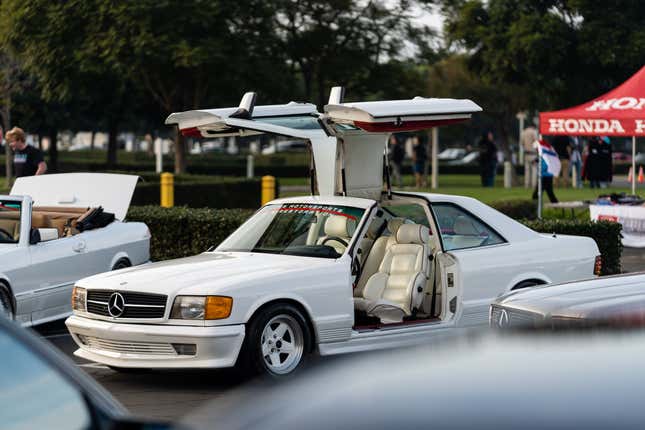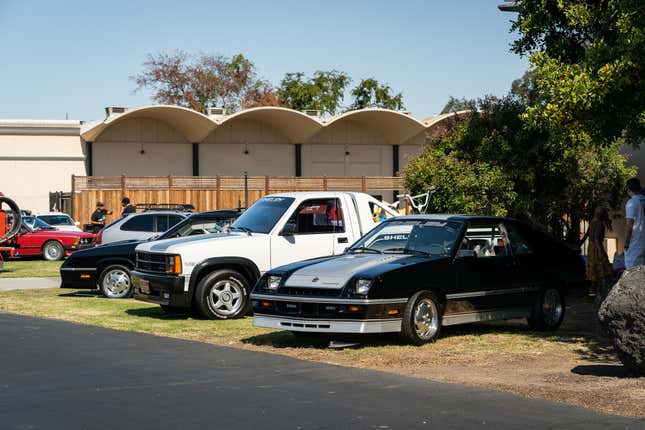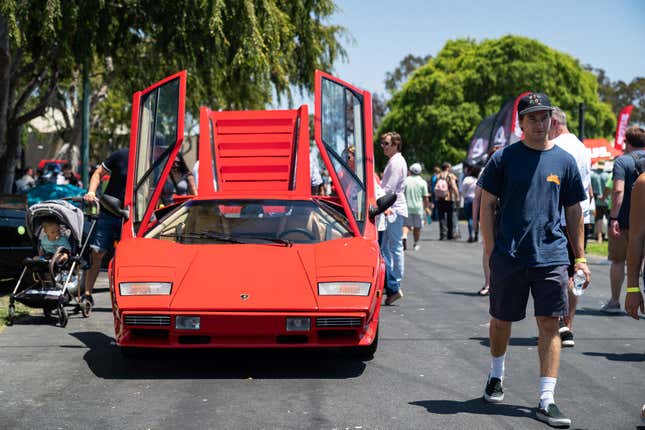The Atlantic Is Right About Classic Cars For The Wrong Reasons

People are allowed to like whatever cars they want to like for whatever reasons they want to, but this recent think piece from author Rich Cohen at The Atlantic just made me boil with rage. The premise within posits that the age of the Boomer dominating the world of automotive enthusiasm has come to a close, and it’s time for Gen X to get its time in the classic car sun.
2024 Chevrolet Colorado ZR2 Bison | First Drive
Okay, as a co-founder of Radwood, I’m onboard for this ride. But when Cohen suggests eschewing the 1960s and 1970s muscle V8 era for the more sedate and restrained Reagan-era cars of his youth (namely a 1980 Mazda RX-7 and a 1985 Toyota Celica), my eyes glaze over and my mouth starts to foam. First of all, there is nothing about a pair of Japanese sports coupes that suggests to me Cohen ever drove anything approaching the values he espouses.
Image: Radwood/Lane Skelton
“The Celica came to seem beautiful because it was efficient. Its allure was its frugality and reliability,” says Cohen. Now, he doesn’t infer whether his ‘85 Celica was an A60-generation with the 2.4-liter 22RE engine and rear-wheel drive, or the FWD-based T160-generation, but both iterations had serious sporting potential, scads of rally victories, and factory-backed efforts in IMSA racing from 1983 to 1988 (winning the GTO championship in 1987). I’ll admit the Celica was always a paragon of reliability, but efficiency and frugality? Paint me ever the skeptic.
Cohen haphazardly complains that a post-muscle Detroit delivered nothing but lemons, listing examples Pacer, Pinto, Citation, and Cimmaron by name. In a bout of hypocrisy Cohen has this incredible juxtaposed prose: “Dragging my father out of Steve Foley Cadillac and down Skokie Boulevard to the Mazda dealership, my mom said, ‘At least it won’t break down.’ A 1980 two-door Mazda RX-7 … was my family’s first foray into the foreign market.” Oh, you couldn’t be bothered with one of the most reliable [if ill-advised] cars on the market, a GM J-platform with an L46 1.8-liter four-cylinder, but you’ll gladly go all-in on a used spinny triangle machine? Pish posh, Rich.

Image: Radwood/Lane Skelton
While Mr. Cohen was driving cars far more exciting than his memories allow, the world of car enthusiasm was breaking free anew all around him without him taking notice. The 1980s were a time of cocaine-fueled excess, whether you were the one taking the cocaine or not. The post-fuel-crisis 1970s hangover had largely dissipated by 1983, and the browns and tans of the new car showrooms began to give way to triple-white full-leather monstrosities, euro-tuners, homologation specials, and some of the quickest cars of all time.

Image: Radwood/Lane Skelton
Even the American Muscle brands had found their way into the modern performance battle with fuel injection and turbochargers. Never discount the value of a Shelby Dodge or Grand National Buick. They’ll cut you down in rapid fashion if you even look at them wrong.

Image: Radwood/Lane Skelton
The 1970s might have borne magnificent machines like the Lamborghini Countach or the impact-bumper Porsche 911, but it was the 1980s where they found their true success-is-excess calling.
To close, Cohen says, “To understand America and its shrunken aspirations, it’s not a ’64 Ford GT40 you should admire as a classic. It’s a sky-blue, two-door ’85 Toyota Celica with manual windows, retractable headlights, and a tape deck blasting the B-side of Bruce Springsteen’s “Born in the U.S.A.” I’m not sure what America he was living in then, but it certainly wasn’t one of ‘shrunken aspirations.’

Image: Radwood/Lane Skelton
The car world of the 1980s I know, despite having been born in 1987 myself, is one of flagrant show-offs-man-ship. Motorsport at the time was basically fueled by drug smugglers throwing cash around like it was confetti. Car design was strakes and scoops and NACA ducts stuck on sharp and wedgy masterpieces from Marcello Gandini and Giorgetto Giugiaro. Technology was advancing at rapid pace, introducing greater safety, speed, and handling to more drivers than ever before. Engines were getting smaller and more efficient, but in many cases producing even more power than before. Hell, even the Fox Mustang was throwing down basically identical 0-60 times with a 5-liter as it had in 1970 with a 428 Cobra Jet.

Image: Radwood/Lane Skelton
You can certainly admire whatever cars from the 1980s you wish, and the Celica certainly was a charming and delightful automobile. Personally I’ll be kneeling to the kings of the era. F40, 959, AMG Hammer, Ruf Yellowbird, Audi Quattro, Shelby GLHS, Saab 900 Turbo, Rabbit GTI and many more. If you think the 1980s were a boring time for cars, you’re boring.

Image: Radwood/Lane Skelton
And don’t even get me started on motorcycles.



